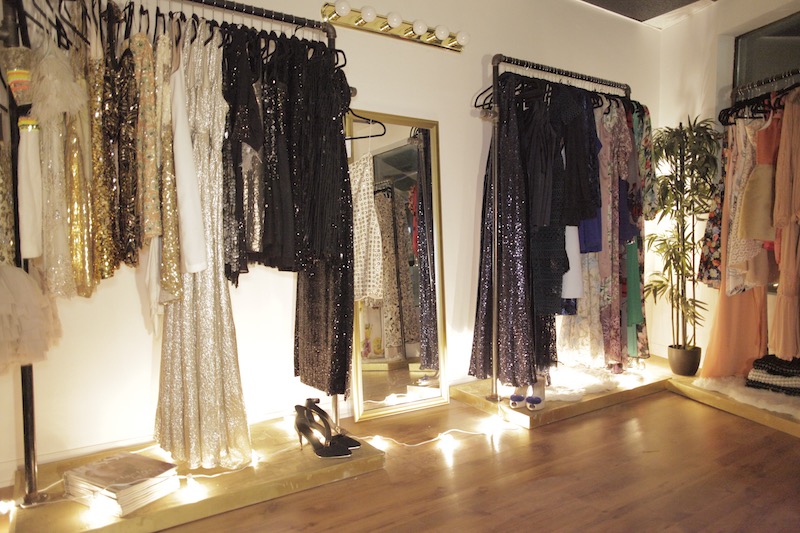If you live in Toronto, chances are you’ve heard of (and maybe have already paid a visit to) Studio Fitzroy Dress Rentals. The playful studio (behind golden gates!) on Dundas Street West houses a seemingly endless supply of must-have dresses in various styles and sizes (from XS to size 16). But this isn’t your everyday dress shop. It’s a rental shop where gaggles of girls known as #FitzroyFoxes flock to grab a gown or some garb to wear to their next event, from weddings and parties to date nights and the like. And though the fox den they’ve created has become a standard in Toronto for stylish girls alike, there are other rental companies such as Rent frock Repeat — and on a larger scale Rent the Runway — that work with the same goal in mind.
The concept of dress rental companies like Studio Fitzroy is simple: in a social media driven day in age, no one wants to wear the same outfit more than once. You rent a designer dress, wear it to your occasion, and return it. The fee includes dry cleaning service, as well as the help of the staff who act as personal stylists to help you find a frock perfect for your body, with the simple goal of making you feel beautiful.

I reached out to Canada’s leading trend forecaster Carly Stojsic to see if rentals are the way of the future. “Brands and retailers have to be as agile as possible to keep up with the ever-changing consumer. Consumers are seeking simplicity and to de-stress and detach from complicated (shopping) experiences and interactions,” says Stojsic, continuing, “While I think companies like Rent The Runway provide a great service and solution to ‘frock fatigue,’ their target is niche and we won’t see renting wardrobes as the golden standard for our stylistic future (on a mass scale). But we will definitely see uptake of renting luxury goods as rental-retailers step up their game!”
Debra Goldblatt-Sadowski, President and Founder of Rock-It Promotion, puts on some of the city’s most notable events — and often rents dresses from Rent frock Repeat — agrees with Stojsic. “I don’t think we’ll only be renting our clothes, but I do think it’s a great option that doesn’t have a stigma attached to it anymore.” She also thinks it gives brands an opportunity to reach even larger audiences and build further brand recognition. “I’ve rented dresses that cost a couple thousand dollars, and I may not have made that investment to purchase that particular dress, but was very happy to rent it for a quarter of the full price,” says Goldblatt-Sadowski.
The ability to make that happiness available played a big part in why Angela Pastor and her partner Julie Buczkowski, owners of Studio Fitzroy, decided to change their entire business model. What started as a pop-up shop with a few rental racks turned into a full-time home, exclusive to rentals. ““By the end of [last] summer we had six rental racks and found it was what most people were coming to us for. Women loved the fact that they could use the dresses and have that experience of looking and feeling amazing without having to commit to buying it. We’ve become very non-committal as a culture of late and that’s okay. We just decided to switch our business model to reflect that. It simply made more sense,” says Pastor.

She says this is similar to the larger trend of the sharing economy, mirroring companies like Uber, Netflix, and Airbnb that promote an experience over ownership. “It saves you money and is more environmentally sustainable as well. It’s a win-win. Once we saw it was working for us and how fast word was spreading, we decided to end the retail side of our business and focus entirely on rentals. We wanted to stay in the neighbourhood where people knew us already, and we opened our rental studio just west of Dundas and Ossington a year ago, October 2016,” says Pastor.
So while businesses like Pastor’s are thriving and changing how we approach fashion, Stojic says rentals – though convenient – won’t replace shopping in the future. “We’re still very much attached to our things, and closet curation is becoming an art form to some. While the value proposition has changed with fast fashion and high rotation of styles in play, entire groups of people aren’t willing to be part of this shared-economy. There are also brands that are trying to design and create collections to offer solutions such as quality, exclusivity and provenance to their items in order to stave off ‘disposability’ and create investment pieces we live in and love for life.”
Do you think renting clothing is the way of the future? Share your thoughts in the comment section.
All images provided by Studio Fitzroy
Posts you might be Interested in:
Struggling Retailers Need to Rebrand if they Want to Survive
Why Japanese Retailers are Making Such a Splash in Toronto
Could Canada Become Oversaturated with Off-Price Retailers?
Online Shopping is Forcing Stores to Change — But it’s not a Bad Thing
Plus Size Shopping is Hard: I Tried 6 Stores and Here’s What I Thought
